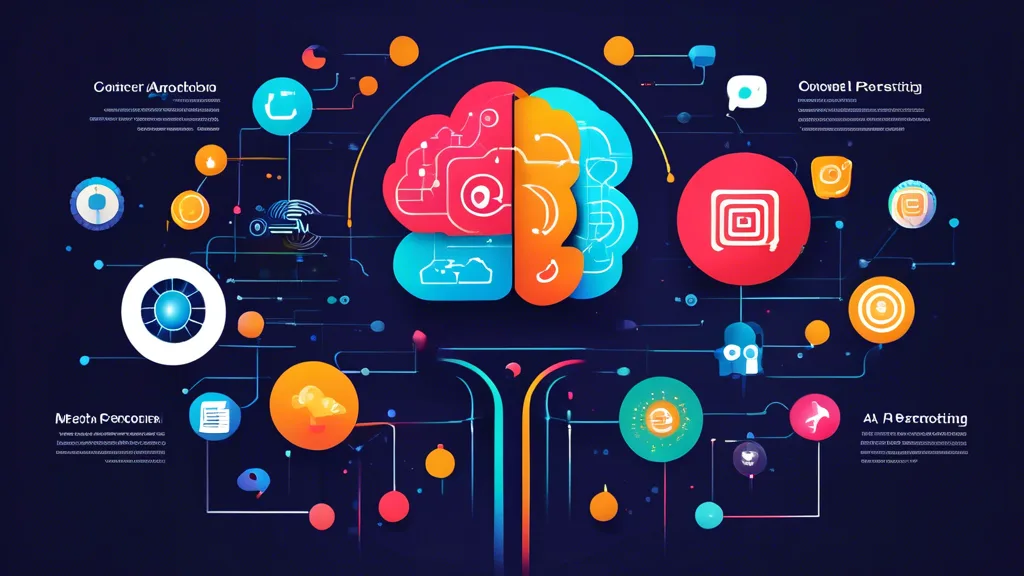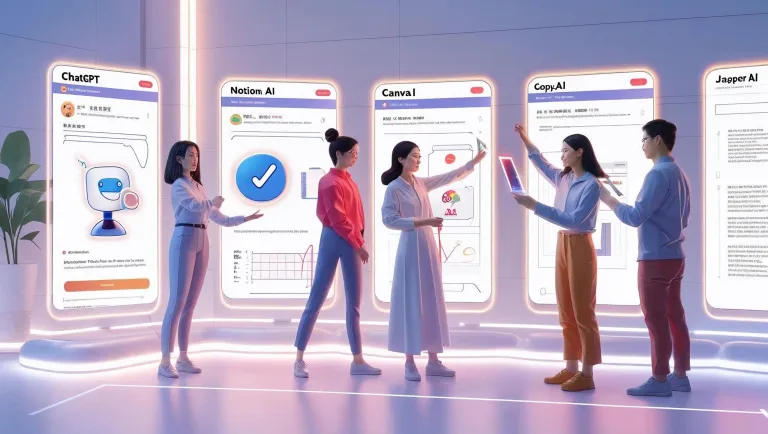Table of Contents
Introduction to AI in Marketing
Artificial intelligence (AI) has emerged as a transformative force in modern marketing, enabling businesses to create personalized, efficient, and scalable strategies. The dynamic nature of AI empowers marketers to analyze vast amounts of data, automate repetitive tasks, and make predictions that improve campaign performance. As the digital landscape evolves, leveraging AI tools has become essential for staying competitive in an increasingly saturated market.
AI enhances marketing processes through data-driven decision-making, allowing brands to focus on audience behavior, preferences, and patterns with unprecedented precision. These tools employ advanced algorithms to create targeted content that resonates with specific demographics, ensuring higher engagement rates. For instance, predictive analytics models can forecast customer purchase intent, empowering marketers to tailor experiences before preferences are explicitly stated.
Automation within AI-driven platforms is another significant advantage. Marketing tasks such as email distribution, customer segmentation, and social media management can now be seamlessly handled by AI. This not only saves time but also minimizes human error, facilitating consistent execution of campaigns across multiple channels. For marketers, this translates into more time to focus on strategy and creative development.
Moreover, AI-powered tools improve conversion rates by enabling real-time feedback and adjustment. Chatbots, for example, provide instant customer support while gathering insights to improve user experiences. Whether optimizing pricing strategies or suggesting cross-sell opportunities, AI ensures a more personalized and impactful customer journey.
As consumer expectations shift towards hyper-personalization and immediacy, AI is increasingly critical for businesses to meet these demands. It bridges the gap between raw data and actionable insights, revolutionizing the traditional approaches to marketing. The adoption of AI technologies is no longer a luxury—it has become a central pillar of effective modern marketing practices.
Why AI Tools are Essential for Smarter Marketing
Artificial Intelligence (AI) tools have become indispensable in the modern marketing landscape due to their ability to transform data-driven strategies into actionable insights. By automating traditionally time-intensive tasks, AI empowers marketers to dedicate their efforts to creativity and decision-making, leading to more effective campaigns and optimized outcomes.
These tools examine vast amounts of data at unprecedented speeds, enabling businesses to predict customer behavior, personalize experiences, and make real-time adjustments to marketing strategies. AI’s capacity to analyze customer journeys and identify patterns helps marketers understand precisely what motivates their audience, ensuring more relevant and impactful messaging. For instance, AI-powered predictive analytics tools can forecast trends, aiding marketers in staying ahead of competitors with data-backed strategies.
Moreover, automation facilitated by AI simplifies repetitive tasks such as email scheduling, social media posting, and audience segmentation. AI-powered chatbots enhance customer engagement and provide instant support, significantly improving the customer experience. Content generation tools, equipped with natural language processing, assist marketers in creating personalized, high-quality copy that resonates with their audience.
AI also plays an integral role in refining ad targeting and improving ROI. Tools such as programmatic advertising platforms use machine learning algorithms to identify the best channels, timing, and audience demographics for delivering ads. Additionally, AI tools provide access to sentiment analysis, allowing brands to monitor and respond to customer feedback on social media and other platforms effectively.
As marketing continues to evolve, AI ensures campaigns remain agile and compelling. Its ability to combine precision, efficiency, and personalization makes it a critical component for navigating today’s competitive digital space. With AI tools, marketers can pivot from guesswork to intelligent strategies, driving growth and value.
Overview of Popular AI Tools for Marketers
AI tools for marketers are designed to streamline tasks, improve decision-making, and enhance customer engagement. These tools are versatile and can be categorized based on their core functionalities, including content creation, analytics, personalization, and automation. The following are some of the most widely used AI tools in marketing.
Content Creation Tools
Marketers often rely on AI-powered content creation tools to generate high-quality copy, blogs, social media posts, and video scripts. Tools like Jasper AI and Writesonic leverage natural language processing to create persuasive marketing content in seconds. Features like tone customization and audience targeting make them invaluable for aligning content with brand strategy.
Predictive Analytics Platforms
Predictive analytics tools use machine learning algorithms to anticipate trends, customer behavior, and sales patterns. Platforms such as Google Analytics 4 and HubSpot integrate predictive insights to help marketers optimize campaigns and allocate resources effectively. These tools enable data-driven decision-making by turning raw data into actionable intelligence.
Personalization Engines
Personalization is key to modern marketing, and AI tools excel in tailoring offerings. Dynamic Yield and Adobe Target stand out for their ability to curate personalized experiences. They analyze customer data in real-time to deliver customized content, product recommendations, and promotions, thereby boosting engagement and conversions.
Marketing Automation Tools
Automation tools simplify repetitive tasks such as email campaigns, lead scoring, and social media posting. Solutions like Marketo and ActiveCampaign provide AI-driven automation features, allowing marketers to focus on strategic activities. Automation reduces manual effort while ensuring workflow consistency.
Chatbot and Conversational AI
AI-powered chatbots, including platforms like Intercom and Drift, enhance customer support and online interactions. These tools employ natural language understanding to answer queries, resolve issues, and guide prospective buyers through the purchasing journey.
Each of these tools represents the cutting-edge of AI applications in marketing, offering robust functionalities to empower marketers at every stage of their campaigns. Transitioning to AI-driven solutions is helping marketing professionals gain a competitive edge by leveraging efficiency and innovation.
AI-Powered Content Creation Tools
AI-powered content creation tools have revolutionized how businesses craft, edit, and distribute marketing content. These tools utilize natural language processing (NLP) and machine learning to generate human-like text, optimize for search engines, and cater to targeted audiences efficiently. By automating labor-intensive writing tasks, marketers can focus on strategy and creativity, reducing time-to-market significantly.
Key features of these tools often include:
- AI-Generated Text: Platforms capable of producing coherent and detailed blogs, social media posts, or ad copies based on prompts entered by users.
- Content Optimization: Tools that assess readability, tone, and SEO relevance in real time, ensuring the content aligns with best practices.
- Editing and Proofreading: AI-driven grammar and style suggestions that help refine drafts for professionalism and accuracy.
- Multilingual Support: Some tools enable the creation of content in multiple languages, allowing businesses to connect with global audiences effortlessly.
Popular AI tools in this domain include Jasper AI for creating engaging blog posts and marketing emails, Writesonic for quick ad copy generation, and Grammarly for editing and tone adjustment. Tools like Surfer SEO integrate AI writing with keyword analysis, helping marketers craft content that ranks higher on search engines. For businesses with diverse client bases, DeepL provides high-accuracy translations, ensuring content resonates with non-English audiences.
AI content creation tools also excel in personalization. With advanced algorithms, they analyze demographic, behavioral, and psychographic data to tailor messaging that speaks directly to a target audience’s needs and preferences. This is especially valuable for email campaigns or dynamic landing pages.
These tools not only enhance efficiency but also scale a marketer’s ability to produce diverse types of content while maintaining quality and relevance. By leveraging AI in content creation, businesses find themselves better equipped to meet the demands of dynamic consumer behavior in the digital age.
AI Tools for Audience Targeting & Segmentation
Audience targeting and segmentation are critical components of effective marketing strategies. Leveraging AI tools for these tasks enables businesses to identify and engage specific customer groups based on data-driven insights. These tools analyze vast amounts of data, uncovering patterns and trends that enhance precision in messaging and campaign delivery. AI empowers marketers to understand audience behaviors, preferences, and demographics with unprecedented accuracy.
AI-driven platforms employ machine learning algorithms to process customer data from various sources, including websites, social media, and CRM systems. They generate detailed customer profiles by analyzing purchasing behavior, browsing history, and even sentiment from online interactions. Tools such as Customer Data Platforms (CDPs) integrate this information, offering dynamic segmentation capabilities. This ensures that marketing efforts are tailored to specific audience groups, which results in improved engagement and conversion rates.
Predictive analytics is another powerful feature of these tools. AI models can forecast future customer behaviors or trends based on historical data. By using these predictions, marketers can refine their targeting strategies, deploy personalized ads, and ensure that their efforts reach the right audience at the right time. Automated segmentation workflows further streamline the process by creating audience segments based on predefined rules or real-time triggers, reducing manual intervention while boosting efficiency.
Key players in AI-driven audience segmentation include platforms such as Adobe Audience Manager, Salesforce Marketing Cloud, and HubSpot. These tools offer functionalities ranging from real-time tracking of customer interactions to advanced machine learning models for segmentation. They cater to businesses of all scales, providing insights that not only increase targeting accuracy but also optimize campaigns for maximum ROI.
With AI-backed audience segmentation and targeting, marketers can transcend traditional boundaries, ensuring a customer-first approach fueled by intelligent automation and actionable data insights.
Enhancing Campaign Optimization with AI
Artificial intelligence (AI) is revolutionizing the way marketing campaigns are designed, monitored, and refined. By leveraging intelligent algorithms and real-time data analysis, marketers now have the tools to deliver more precise, impactful campaigns while reducing inefficiencies. AI enhances campaign optimization by providing a deeper understanding of audience preferences, automating tedious processes, and allowing adaptive decision-making.
One key advantage of AI in campaign optimization is predictive analytics. AI tools analyze historical data, market trends, and user behaviors to forecast campaign performance and suggest strategies for improvement. These insights empower marketers to adjust their content, timing, and targeting to achieve maximum ROI. Furthermore, AI-driven segmentation identifies niche audience subsets that traditional approaches might overlook, enabling hyper-personalized messaging.
Another core benefit is real-time campaign monitoring. AI-powered platforms continually assess campaign performance across multiple channels, using KPIs such as click-through rates, conversions, and engagement metrics. This instant feedback loop allows marketers to pivot strategies on the fly, eliminating wasted ad spend and improving alignment with customer expectations. Automated A/B testing is also streamlined, enabling rapid experimentation to determine what resonates best with different audiences.
AI also boosts campaign optimization by automating repetitive processes. Tasks such as bid adjustments in programmatic advertising, scheduling social media posts, and keyword optimization for search engine marketing are now handled efficiently by AI. This automation not only saves time but also minimizes errors, ensuring campaigns stay on course.
As campaigns scale, the flexibility of AI ensures continuous improvement. By learning from every interaction and outcome, AI systems refine their algorithms, helping marketers develop smarter, more adaptable strategies for future initiatives. This approach creates a feedback loop where every campaign becomes a stepping stone for the next, fostering sustained growth and competitive advantage.
AI in Predictive Analytics for Enhanced Marketing Strategies
Predictive analytics powered by AI has transformed the way marketers design and execute campaigns, enabling more precise targeting and personalization. By leveraging historical consumer data and advanced machine learning algorithms, businesses gain actionable insights to forecast future behaviors, trends, and preferences.
AI excels at identifying patterns hidden in massive datasets that traditional methods may overlook. Predictive models analyze factors such as individual purchasing history, browsing behavior, social media engagement, and demographic information. This allows marketers to anticipate customer needs and craft timely, relevant messaging to drive engagement.
Applications of AI in Predictive Analytics:
- Customer Segmentation: AI enables businesses to create dynamic customer segments by analyzing behavior, preferences, and lifetime value. Marketers can focus on high-value segments with tailored offers.
- Lead Scoring: Predictive scoring systems prioritize leads based on their likelihood to convert. This optimizes sales and marketing alignment, ensuring resources are allocated efficiently.
- Demand Forecasting: Advanced forecasting models assist in planning inventory, promotional activities, or product launches by predicting market trends and customer demand.
- Churn Prevention: Algorithms detect signs of disengagement or dissatisfaction. Businesses can proactively implement retention strategies like personalized offers or customer outreach programs.
- Personalized Recommendations: Machine learning tools deliver hyper-personalized product or service suggestions, boosting cross-selling and loyalty efforts.
AI-driven predictive analytics promotes agility in adapting to consumer trends and competitor movements. Tools like Salesforce Einstein, SAS Advanced Analytics, or Google AI continually update models based on real-time data, ensuring accuracy and relevancy. When effectively integrated into marketing strategies, AI enhances ROI by connecting brands with the right audience at the optimal time, minimizing guesswork in decision-making.
Chatbots and Conversational AI for Lead Engagement
Chatbots and conversational AI tools are transforming how businesses approach lead engagement by providing real-time, intelligent interactions with potential customers. These tools streamline communication, handle inquiries efficiently, and guide prospects through the sales funnel without human intervention. Enhanced by machine learning algorithms and natural language processing, they excel in creating personalized experiences.
Companies deploy chatbots to address frequently asked questions, recommend products, and schedule services. These AI-driven tools operate 24/7, ensuring uninterrupted engagement and eliminating wait times. For example, potential customers visiting a website can instantly receive tailored suggestions or even resolve concerns, fostering a sense of immediacy and trust.
The integration of conversational AI into messaging platforms like WhatsApp, Facebook Messenger, and Slack enhances accessibility, meeting customers where they are most active. Features such as multilingual support allow businesses to connect with diverse demographics, broadening market reach without additional resources. Chatbots can also gather valuable data during interactions, enabling marketers to analyze behaviors, preferences, and pain points to refine their strategies.
Advanced chatbots incorporate sentiment analysis to identify customer moods and adjust their responses accordingly, creating empathetic and human-like conversations. Many tools integrate seamlessly with CRM systems to automatically log interactions, trigger follow-ups, and keep sales teams informed.
Organizations utilize chatbot analytics to measure performance, identify drop-off points, and optimize conversation flows. Combined with marketing automation, these features can turn casual interactions into actionable leads with higher conversion potential.
By blending automation with customization, chatbots and conversational AI redefine lead engagement, ensuring businesses remain competitive in an ever-evolving digital landscape.
AI Tools for Personalized Customer Experiences
Personalized customer experiences have become essential for effective marketing, and AI tools now play a pivotal role in delivering them. By analyzing vast amounts of customer data, artificial intelligence can accurately predict preferences, behaviors, and needs, enabling businesses to craft tailored strategies that resonate deeply with audiences. These tools rely on machine learning models, deep learning algorithms, and real-time data processing to refine customer interactions and ensure relevance in communication.
Key AI tools encompass technologies designed for customer segmentation, behavior analytics, and predictive modeling. These solutions include customer relationship management (CRM) platforms infused with AI, such as Salesforce Einstein, which uses artificial intelligence to create customer profiles, recommend actions, and forecast purchasing behavior. Tools like Dynamic Yield and Segment specialize in personalizing website content and email marketing campaigns based on comprehensive customer journey data. Virtual assistants, like AI-powered chatbots, further enhance user engagement by offering seamless, personalized communication across various channels.
AI-powered recommendation engines are another significant category, offering personalized product or service suggestions leveraging historical and real-time engagement data. Netflix and Amazon exemplify the success of such engines, guiding users toward relevant content and shopping decisions while improving overall satisfaction. Sentiment analysis tools, such as MonkeyLearn or Lexalytics, provide deeper insights into customer emotions by analyzing feedback, reviews, and social media interactions. These insights empower marketers to adjust strategies accordingly, ensuring alignment with customer expectations.
The adoption of AI tools for personalization improves not just the customer experience but also marketing efficiency. Automating personalization reduces manual effort while increasing the relevance of targeted campaigns. Businesses leveraging these technologies are better equipped to foster long-lasting relationships, drive higher conversion rates, and enhance customer loyalty by addressing individual needs effectively.
Performance Tracking and Analytics Tools Powered by AI
Tracking marketing performance and using data analytics to make informed decisions are essential in any strategic campaign. AI-powered tools have revolutionized how marketers approach these areas, providing precise, actionable insights that drive growth and efficiency. By leveraging machine learning and automation, these tools enable marketers to shift from reactive to proactive strategies.
AI-based performance tracking tools monitor campaigns across multiple channels, providing real-time insights. They help measure metrics such as click-through rates, bounce rates, conversion rates, and customer lifetime value. Platforms like Google Analytics with AI-driven enhancements offer predictive analytics, enabling teams to forecast outcomes and stay ahead of market trends. Similarly, software tools like HubSpot and Adobe Analytics integrate AI to identify patterns in customer behavior, improving targeting accuracy.
Advanced analytics tools also utilize natural language processing (NLP) to analyze unstructured data, such as social media comments, customer reviews, and survey responses. This provides qualitative insights into consumer sentiment and brand reputation. With sentiment analysis driven by AI, marketers can adjust messaging to resonate better with their target audience.
AI algorithms also simplify A/B testing by identifying the most effective variations in design, content, or segmentation. These AI capabilities shorten testing timelines and enhance decision-making with highly accurate results. Furthermore, predictive analytics powered by machine learning gives teams the ability to foresee market shifts or customer actions, offering unparalleled competitive advantage.
Through seamless integration with CRM systems, AI tools provide a central hub for data collection and reporting. This holistic view helps businesses align their KPIs with actual performance metrics, ensuring targeted and data-driven campaigns. By deploying AI-driven performance tracking and analytics tools, companies position themselves to maximize ROI and improve long-term marketing success.
Future Trends in AI Marketing Tools
The evolution of AI in marketing is set to redefine how brands communicate, strategize, and convert audiences. Several emerging trends are shaping the future landscape of AI marketing tools, emphasizing personalization, automation, and advanced analytics.
- Hyper-Personalization Through Advanced AI Future AI tools are expected to leverage deeper data insights to deliver hyper-targeted marketing campaigns. By analyzing granular behavioral and contextual data, marketers can craft unique, one-to-one interactions tailored to individual preferences across multiple touchpoints.
- AI-Powered Predictive Analytics Predictive analytics is poised to become more sophisticated, enabling marketers to anticipate consumer behaviors and trends with greater accuracy. As AI algorithms grow more advanced, tools will predict customer churn, potential leads, or even ideal messaging times, sorting strategies for efficiency and impact.
- Voice and Visual Search Optimization The increasing reliance on voice and visual search by consumers is driving AI tools to adapt. AI-powered marketing platforms will incorporate advanced recognition technologies to ensure seamless optimization for these mediums, offering marketers leverage in non-textual search spaces.
- AI-Driven Content Creation and Curation The automation of content production is set to advance with smarter tools that not only generate text but also create designs, videos, and dynamic ads. Enhanced natural language processing (NLP) and artificial intelligence will allow for more compelling and contextually relevant brand storytelling.
- Real-Time Behavioral Feedback Loops AI-powered tools are increasingly integrating real-time analysis to adjust campaigns dynamically. These feedback loops can monitor performance metrics in the moment, enabling marketers to fine-tune messages, visuals, or offers instantaneously for better ROI.
- Ethical AI and Transparency As data privacy concerns and ethical AI push to the forefront, marketing tools will need to integrate transparent algorithms and practices. Customers demand greater visibility in how their data is utilized, suggesting AI will need to balance personalization with privacy-first approaches.
A combination of these trends is likely to pave the way for marketing tools that are smarter, more intuitive, and capable of handling ever-increasing consumer expectations. The continued collaboration between technology and human creativity will play an integral role in defining success for marketers in this evolving sphere.
Conclusion: Leveraging AI for Smarter Marketing Success
Artificial Intelligence continues to transform the marketing landscape, enabling businesses to optimize processes, improve decision-making, and drive higher engagement. By integrating AI-powered tools, organizations can enhance their ability to create relevant content, target the right audiences, and convert prospects into loyal customers. Managing marketing campaigns is no longer limited by human constraints, as AI introduces efficiency, scalability, and accuracy to modern strategies.
AI tools assist with content creation by analyzing vast amounts of data to understand trends and preferences. Language models such as GPT are increasingly used to generate tailored messaging and eye-catching visuals. These tools also streamline workflows, allowing marketing teams to focus on higher-level strategy while automating repeatable tasks. From social media posts to email campaigns, AI ensures content is both personalized and impactful.
When it comes to targeting, AI refines audience segmentation through advanced algorithms and predictive analytics. Marketers can use tools that assess user behavior, purchasing patterns, and demographic data to build precise profiles. This allows teams to target individuals at the right moment with relevant offers, increasing conversion rates and minimizing wasted ad spend. The ability to test and optimize campaigns in real time further ensures improved outcomes.
AI also plays an instrumental role in conversion optimization, providing data-driven insights into customer journeys. Machine learning algorithms can track user behavior to identify barriers to conversion. Tools such as dynamic pricing engines, chatbots, and recommendation systems cater to individual needs, simplifying the purchase process and keeping customers engaged throughout their experience.
The adoption of AI technologies in marketing creates opportunities for smarter decision-making and scalable growth. Businesses leveraging AI gain a competitive advantage in reaching their audience with precision and achieving measurable results.
👉 Want to explore how AI works even if you’re not a tech expert? Check out our in-depth guide: Artificial Intelligence for Non-Techies: A Beginner’s Guide. It’s the perfect starting point for anyone curious about AI without a technical background.






[…] up on our previous post, “AI in Marketing: The Ultimate Toolkit to Create, Target, and Convert Faster,” this extended guide will explore the best AI marketing tools in 2025. These tools are […]
[…] don’t miss our deep dive into the top 10 AI tools anyone can use today, or discover how AI is streamlining marketing strategies across industries. For those interested in security applications, our guide on cybersecurity […]